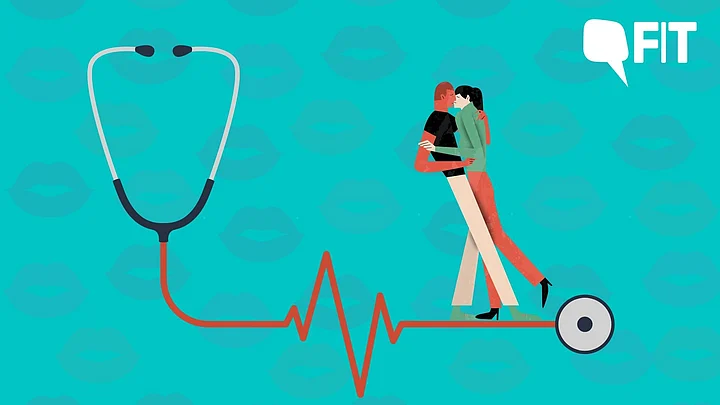It's been said time and again that it is wise to avoid sexually transmitted infections (STIs, formerly known as STDs) by following safe sex practises. But what about kissing? Can you get an STI from lip contact?
You may be at more risk than you know – as some infections do spread by kissing.
"It might sound slightly bizarre to many, but it is very much possible to get sexually transmitted infections through kissing," Dr Chaitanya Singh, MD, Dermatologist, told FIT.
According to Dr Singh, while the overall risk of getting an STI from kissing is fairly low, it is something that legitimately happens.
First, You Can Get Some Common Infections
One can contract or pass on quite a few health problems through contact with saliva or oral sores.
"A few common diseases or pathogens that can be spresd through kissing can be infectious mononucleosis, also known as kissing disease, common cold, flu viruses, and now COVID-19," says Dr Chaitanya.
There are also chances of oral warts spread through human papillomavirus (HPV).
STIs, STDs, Kissing
According to Dr Singh, there are two things that two types of people you can contract diseases or infections from via kissing:
Patients whose oral mucosa completely intact
Patients whose oral mucosa is compromised (like active bleeding or mouth ulcers then other diseases come into play like hepatitis B, and HIV)
If you are a healthy person who gets a full body check up along with STI/STD panel tests done on a regular basis, kissing is a very low risk sexual activity.
But situations where someone has an active infection or symptoms such as oral sores. Here are some of these infections:
Herpes: Called oral herpes, HSV-1 can easily be passed on through kissing – as it is one of the most contagious STIs. It can be transmitted even if the infected person is asymptomatic.
The most notable symptom is a small white or red blister on the mouth or genitals – which may bleed during an outbreak.
"Touching or kissing an active cold sore can transmit the virus. The virus can also be spread when no symptoms are present," Dr Singh added.
Syphilis: While rare, syphilis can spread through kissing. Firm, round, and painless sores at the site of infection are a symptom of syphilis, along with skin rash, swollen lymph nodes, and fever.
Treatment
"The treatment is usually same for STIs whether they're contracted through kissing or otherwise. However, there are protocols and proper treatment guidelines and whether it is oral or genital, the treatment remains the same," says Dr Singh.
The type of treatment required is determined based on where the ulcer or infection is located. For example oral ulcers require topical gels or mouthwash – and the treatment is symptomatic.
The infections, in most cases are absolutely treatable and the person showing symptoms as well as their partner, both should be treated.
How Do You Prevent STIs From Kissing?
Never shy away from asking a person for their medical history – because it is always wiser to take precautions to prevent an infection.
Avoid kissing anyone with cold, flu, or any visible infection: While people with herpes and syphilis may not show any signs of the STI, it's most likely to happen when you can actually see a sore.
You don't kiss a new person without knowing their health and hygiene habits.
Do not let anyone make you feel bad about asking things upfront.

